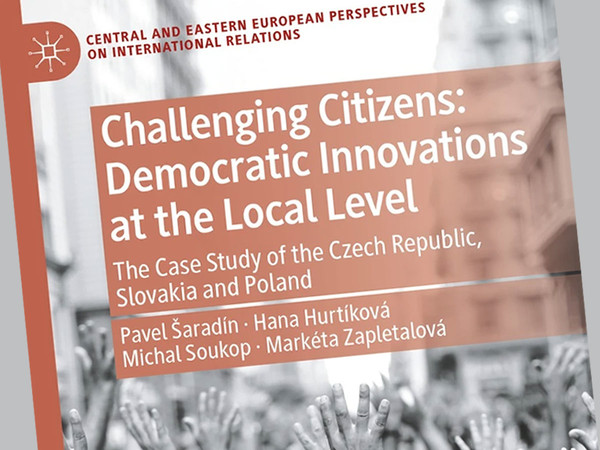The local level of politics, which is essential in shaping and especially strengthening pro-democracy thinking, is the focus of a new publication entitled Challenging Citizens: Democratic Innovations at the Local Level. The Case Study of the Czech Republic, Slovakia and Poland. The book was written by a team of authors led by Pavel Šaradín from the Department of Politics and European Studies at the Palacký University Olomouc Faculty of Arts and is the first-ever comprehensive work to reflect this part of Central Europe in that respect. It is published by Palgrave/Macmillan.
The book is one of the results of a three-year research project supported by the Czech Science Foundation. On behalf of the authors, Assoc Prof Pavel Šaradín from the Department of Politics and European Studies at the UP Faculty of Arts was interviewed by Žurnál Online.
Mr Šaradín, could you briefly introduce the book? What is its aim?
The crisis or erosion of democracy, its decline, is an oft-discussed theme. Sometimes rightly so; sometimes the situation is underestimated, other times overestimated. The local level enables active participation of citizens in politics, through various tools and innovations. We have evidence that if such tools are introduced and used correctly, they can indeed play a very important role in the positive meaning of democracy. In our book, we focus on clarifying these tools, how they work, what experiences we have with them, and how we evaluate them. Our aim was not to write a theoretical book, but rather conduct empirical research; we wanted to back up our findings with data.
What are these democratic innovation tools? What can they affect, how can they help?
We understand democratic innovation as processes and tools that lead to a deepening of citizen participation in the process of governance with the aim of improving and reinvigorating that governance. It is therefore a matter of improving democracy, a kind of democratisation of democracy. It involves, for instance, participatory budgets, participatory planning, and so on – something that reinvigorates democracy. At the same time, these processes have other functions that are not only related to political effectiveness. For example, citizen participation can improve transparency, increase trust in politics, enhance accountability, and help people learn how politics works and understand it better. These are very important benefits for the perception of national politics, too. The contribution of our book is not only in explaining why these innovations work, but also why they are sometimes abandoned or why they break down. These are usually cases when they are poorly implemented and have no political support, when communication fails, etc.
The book is also a case study of the Czech Republic, Slovakia, and Poland. So you deal with the functioning of democratic innovation in three Central European countries. What are the differences between these countries in that regard, and what do they have in common?
We didn’t want to write about a single country; the comparative dimension was important to us. However, comparison is not always feasible, as the three countries have different rules for the functioning of municipal politics. In Poland it is obligatory for larger cities to have a participatory budget, unlike in Slovakia and Czechia. Czechia is also where other innovations are the most widespread and used. One thing these countries have in common is that, as in the whole of post-communist Europe, there is less willingness to participate in politics and less trust in it. This is a huge contrast with Western and especially Northern Europe.
How long did you and all the other authors work on the book? What sources did you use?
The book was written as part of a three-year research project supported by the Czech Science Foundation. Its publication was also supported by the UP Faculty of Arts. We spent a year collecting information and doing research, then about two years writing the book, responding to peer review, and doing the usual editorial work. As far as I know, it is the first such comprehensive book that reflects this part of Central Europe; the western countries have already been researched.
The book is published by the prestigious Palgrave/Macmillan publishing house. What is the significance of the involvement of this publisher for you?
Huge. In the social sciences, there are three publishers that are particularly important: Springer, Palgrave, and Routledge. The whole process has been quite demanding, from filling in the initial forms describing the methodology and assessing the academic contribution and innovation, through submitting part of the manuscript, to its completing and editing. The making of this book of ours was equal to the publication of five or six articles in prestigious journals.
